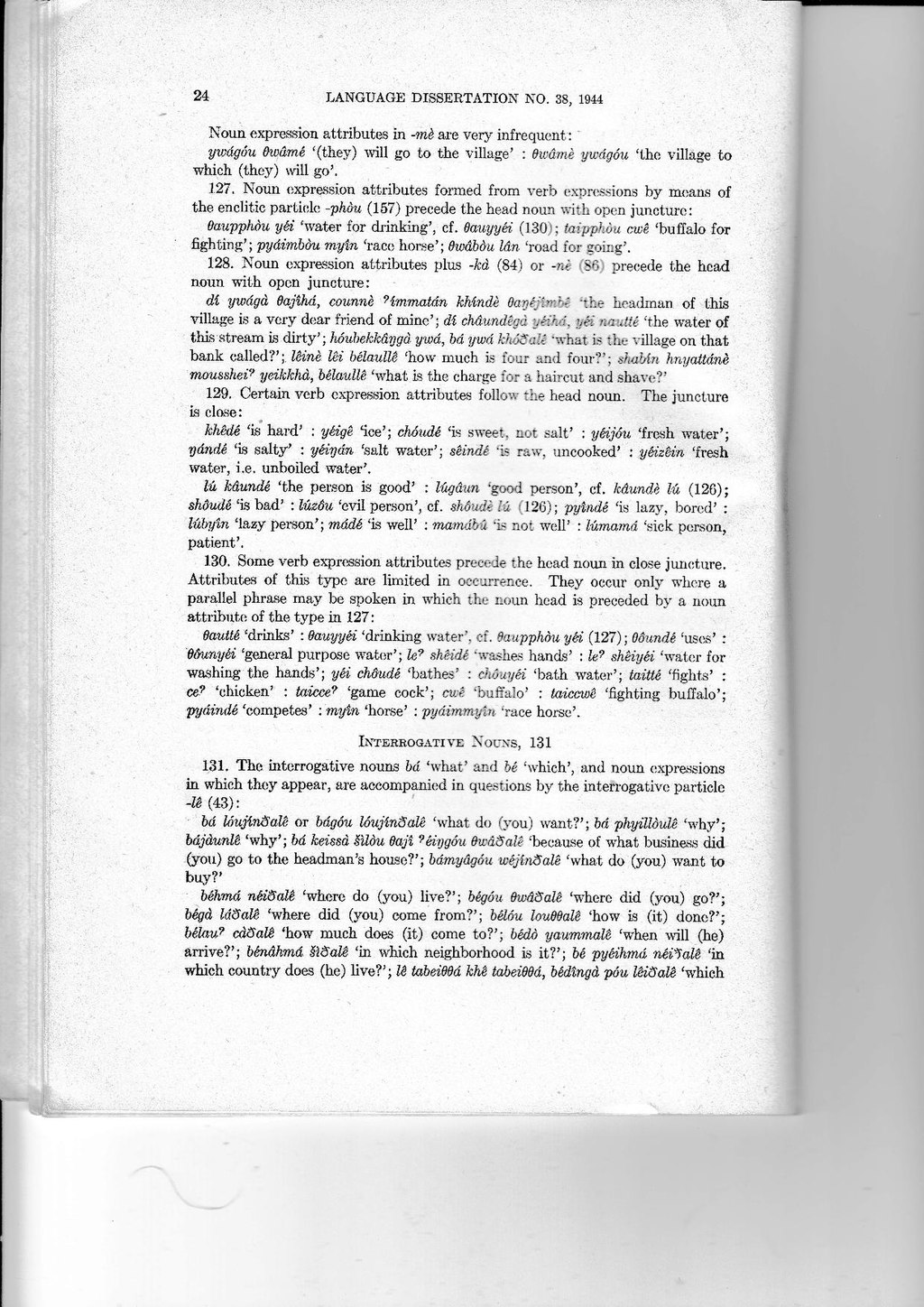Noun expression attributes in ‑mè are very infrequent:
ywágóu θwâmé ‘(they) will go to the village’: θwâmè ywágóu ‘the village to which (they) will go’.
127. Noun expression attributes formed from verb expressions by means the enclitic particle ‑phòu (157) precede the head noun with open juncture:
θaupphòu yéi ‘water for drinking’, cf. θauyyéi, (130); taipphòu cwê ‘buffalo for fighting’; pyáimbòu myîn ‘race horse’; θwâbòu lân ‘road for going’.
128. Noun expression attributes plus ‑kà (84) or ‑nè (86) precede the head noun with open juncture:
dí ywágà θajîhá, counnè Ɂímmatán khíndè θaŋéjîmbê ‘the headman of this village is a very dear friend of mine’; dí châundêgá yéihá, yéi nautté ‘the water of this stream is dirty’; hóubekkâŋgà ywá, bá ywá khóðalê ‘what is the village on that bank called?’; lêinè lêi bélaullê ‘how much is four and four?’; shabín hnyattánè moussheiɁ yeikkhà, bélaullê ‘what is the charge for a haircut and shave?’
129. Certain verb expression attributes follow the head noun. The juncture is close:
khêdé ‘is hard’: yéigê ‘ice’; chóudé ‘is sweet, not salt’: yéijóu ‘fresh water’; ŋándé ‘is salty’: yéiŋán ‘salt water’; sêindé ‘is raw, uncooked’: yéizêin ‘fresh water, i.e. unboiled water'.
lú kâunde ‘the person is good’: lúgâun ‘good person’, cf. kâundè lú (126); shôudé ‘is bad’: lúzôu ‘evil person’, cf. shôudè lú (126); pyîndé ‘is lazy, bored’: lúbyîn ‘Iazy person’; mádé ‘is well’: mamábû ‘is not well’: lúmamá ‘sick person, patient’.
130. Some verb expression attributes precede the head noun in close juncture. Attributes of this type are limited in occurrence. They occur only where a parallel phrase may be spoken in which the noun head is preceded by a noun attribute of the type in 127:
θauté ‘drinks’: θauyyéi ‘drinking water’, cf. θaupphòu yéi (127); θôundé ‘uses’: θôunyéi ‘general purpose water’; leɁ shêidé ‘washes hands’: leɁ shêiyéi ‘water for washing the hands’; yéi chôud´d ‘bathes’: chôuyéi ‘bath water’; taitté ‘fights’: ceɁ ‘chicken’: taicceɁ ‘game cock’; cwê ‘buffalo’: taiccwê ‘fighting buffalo’; pyáindé ‘competes’: myîn ‘horse’: pyáimmyîn ‘race horse’.
Interrogative Nouns, 131
131. The interrogative nouns bá ‘what’ and bé ‘which’, and noun expressions in which they appear, are accompanied in questions by the interrogative particle ‑lê (43):
bá lóujínðalê or bágóu lóujínðalê ‘what do (you) want?’; bá phyillòulê ‘why’; bájàunlê ‘why’; bá keissà šìlòu θajî Ɂéiŋgóu θwâðalê ‘because of what business did (you) go to the headman’s house?’; bámyâgóu wéjínðalê ‘what do (you) want to buy?’
béhmá néiðalê ‘where do (you) live?’; bégóu θwâðalê ‘where did (you) go?’; bégà láðalê ‘where did (you) come from?’; bélóu louθθalê ‘how is (it) done?’; bélauɁ càðalê ‘how much does (it) come to?’; bédò yaummalê ‘when will (he) arrive?’; bénâhmá šìðalê ‘in which neighborhood is it?’; bé pyéihmá néiðalê ‘in which country does (he) live?’; lê tabeiθθá khê tabeiθθá, bédîngà póu lêiðalê ‘which
